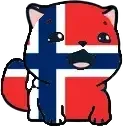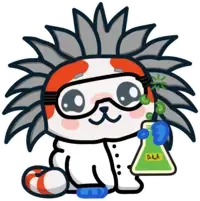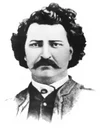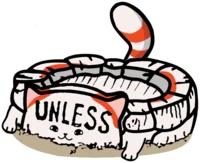- 3
- 27
- 33
- 38
Back home after a week in a psychiatric hospital. My psychiatrist wanted me to stay another week but I asked to continue treatment outside. He's also going to speak to my family to help. I learned a lot, including DBT techniques I'm already attempting to implement. Stuff like avoiding avoiding things, accepting reality on reality's terms, understanding that the way out of hell is through misery, and doing the opposite of what your irrational compulsions demand (e.g. I'm scared to check my inbox = open your inbox right now, no delaying). But enough about that.
Of all the effortposts, I enjoy the biographies. My Helen Keller post is my favorite so far. Unfortunately, the biographies seldom gain much traction.
https://rdrama.net/post/217654/the-adventures-of-helen-keller-a
Nevertheless, I'm going for another one. Here's a name you've heard before - Max Stirmer. To some, he is the funny meme guy.
To philosophers, he is outdated and not particularly relevant in the greater scheme of things. So who is the lad and what does he stand for? Let's discuss and please feel free to correct errors. I'd like to apologize for this previous post. It was terrible and I was abusing drugs.
https://rdrama.net/post/242875/holly-is-in-heat-right-now
However, I'm going to try and write better this time around. If I can't write, there's no reason to be alive.
The Ego and its Own
Stirner, in The Ego and His Own, outlines an egoistic philosophy centered on the individual. To Stirner, each individual is profoundly unique and is “a repository of unique experience and ideas” and while some similarities between individuals do undoubtedly exist, Stirner claims that any likeness “holds good only for comparison or reflection; in fact I am incomparable, unique. My flesh is not their flesh, my mind is not their mind”. Do you agree?
The problem is that this radical uniqueness poses a problem to any form of representation that relies on citationality. You see, language requires predetermined categories for a community of speakers to communicate. According to Ferdinand de Saussure, the relationships between signs and the ideas they represent are determined through previous usage; speakers know what a word means today because of what it meant yesterday. Take the word "tree" for example. It only has value because we have both decided what it refers to. If I decided to use "tree" to describe a bed tomorrow, the entire concept of language would collapse.
Sounds good so far? Well, we gain and we lose.
In short, “language is always an inheritance from the past”, Saussure tells us. For these categories created by language to retain applicability over time and in multiple contexts, they lose out on specificity. What does this mean? Well, language can only represent generalities, not uniqueness. Words are iterative. We're working with categories, not specific things.
==========
Quick notes from Holly!
Words may be products of the past, but they are not static. For example, the word “stupid” was once a medical term but is not a playground insult. Society has changed and so too has our usage of the term.
Other words like barbarian have gone through similar changes. Can you think of any other examples? I can think of one that begins with the letter N.
==========
To put things in simple terms, you can't just make random sounds. If you want to be understood, you have to rely on symbols, gestures, and vocalizations that mean today what they meant yesterday. The amount of symbols in a community is limited. Consequently, we find that labels purporting to represent us do not represent our uniqueness, only the generalities.
What about humans? What does that word mean? Typically, we look at the human through chromosomes. However, if we do this, we leave out individuals with different chromosome numbers, such as those with Down syndrome. Down Syndrome is caused by a genetic mutation of chromosome 21, resulting in a total of forty-seven chromosomes instead of the forty-six used to separate humans from other organisms. But they're still humans.
Maybe all members of the human race are bipedal? Not true. Using upright bipedalism as a key characteristic of humans presents problems too, one of which is posed by the Turkish Ulas family, five of whom walk with a quadrupedal gait “fluently and effectively, and seemingly without discomfort”.
Help us Stirner! How do we deal with the uniqueness of humans? Is it possible to provide an all-encompassing definition of the word “human” without sacrificing our uniqueness?!
What is a human to Stirner
As the German philosopher explains, it is only “humans” who should receive the benefits of rights. Consequently, “the ancients did not observe anything of this sort in their slaves”. The logic behind this? Stirner imagines it as such: “if I did not see the Man in you, what occasion should I have to respect you?”.
The result is that you're forced to self-label as human because if you do not, you forfeit the protection of the humans offer to others, in the West at least. That is how powerful language is, and as you'd expect, that power has been used to dehumanize groups, leaving them vulnerable. As Stirner summarises, it is the State that can give one human rights hence “the individual's human value consists in being a citizen of the State”.
So, what Stirner is trying to argue? If I understand him correctly, he is claiming that language is a category of being, but due to the iterative nature of language, there are no terms to describe YOU and your uniqueness. Hmmm, so it seems that every representation exacts some cost, in the form of lost truth. Every word has a remainder, an element of uniqueness that is left out. Despite this, you have to use the human label if you want human rights.
Stirner reaches the limits of language
One solution to the inaccuracies of language, and labels in particular is simply to mould oneself to fit. However a human is defined, do that. What about other words? I'm thinking of terms like “normal”, “acceptable”, and “conventional”.
We see folks trying to do exactly this all the time. For example, homosexual individuals in a homophobic society like Saudi Arabia might adopt “typical” (what is “typical”? Do you understand how deep the rabbit hole goes and why we're still discussing these ideas decades later?) heterosexual behaviors, up to and including heterosexual marriage, to fit the socially acceptable heterosexual label. This is known as “passing”, and it involves abiding by what is expected of heterosexuals.
This creates a situation where one must sacrifice one's uniqueness to comply with the categories available to represent oneself. Furthermore, it results in individuals attempting to serve representations instead of using representations to serve the individual's uniqueness. To Stirner, this is unacceptable because “the unique character of each human being is undeniable and critically important”. I agree, Stirner.
For these reasons, the language used to describe oneself or others is worthy of deeper investigation. The first, and arguably most important, question that arises concerns the efficacy of language in describing unique aspects of individuals. This problem is a product of the iterative nature of language. The signifiers within a language system, except for proper nouns, never refer to simply one object or concept but rather, they refer to a class of ‘things'.
For instance, the word ‘bicycle' does not point to a specific bicycle but instead signals a class of transport characterized by its use of wheels for locomotion, pedals for power, and handles for control. I feel like I'm repeating myself at this point. It should be clear what the problem of language and uniqueness is, and it is a conundrum that Stirner was determined to get to the bottom of.
You see, words being iterative is useful and essential to the concept of language - the communal nature of words is the reason they permit interlocution. However, on the other side of this coin, the iterative nature of these words leave out the specificities of things. Words become rough estimations, digital representations that turn analog curves into corners.
Spooks
Stirner uses the word “spook” to describe these fixed ideas that make individuals sacrifice their uniqueness. He looks upon these spooks with contempt, claiming that the masses who serve them are “veritable fools" and the only reason they are not regarded as insane is that the whole world is a madhouse where most have their heads haunted by these spooks which include not just the representational category of “human”, but also other fixed ideas such as “morality, legality, Christianity”, among many others.
According to Stirner, the uniqueness he outlines is not a spook because “it is not in any sense an idea like freedom, morality, humanity, and the like; it is only a description”. I think he fucks himself over and just admits that a spook is a spook, just as every word is a spook. But, of course, I'm no philosopher.
If, as Stirner claims, the uniqueness of the individual is of utmost importance, then sacrificing it is an unacceptable solution to the problem of representation. Stirner proposes Egoism as an escape from the pitfalls of representation.
==========
Quick notes from Holly!
Stirner hated liberalism and its followers. Liberalism, Stirner claims, aims to make everyone “ragamuffins” or “have-nothings”. Within Egoism, however, Stirner wishes to strip himself of even more than the have-nothings by rejecting all spooks, including that of the ‘human' label that claims to represent him.
“It is more than ragamuffinhood, however, when I throw away Man too because I feel that he too is alien to me”, he writes. Thus with egoism “even the last rag has fallen off, here stands real nakedness, denudation of everything alien”.
==========
If my interpretations are correct, Stirner's solution is one whereby the false representations of fixed ideas are shunned for the products of one's uniqueness. Stirner's egoism represents an ideal whereby an individual can shed all externally imposed representations.
However, this may be an unrealistic ideal as it is impossible to completely void oneself of spooks. Can this truly be done? Can you exist void of spooks, not requiring any labels? I think not, personally, and I believe that trying to escape language is like trying to escape power or hierarchies - impossible. Sadly, whatever uniqueness you were born with was probably lost years ago, beaten out of you by language and you didn't even know it.
Lastly, if, as I would argue, all representations fail to accurately serve the individual's uniqueness, a complete rejection of spooks would require the anarchic act of shunning all representation. However, if this was extended to the representational system of language, cognition as we know it might be impossible. According to Saussure, in the absence of the distinct categories created by language, thought is an ill-defined mass where ideas cannot be separated from each other. In his words: “without language, thought is a vague, uncharted nebula. There are no pre-existing ideas, and nothing is distinct before the appearance of language”. We literally cannot think without language.
We've seen this in action in deafblind children who never learned language. Their intellect was restricted. This didn't have to be the case because these children can learn language, at which point they are capable of normal cognitive abilities.
Conclusion
Language works by deriving meaning from past usages of signifiers. However, individuals may be too unique to be verisimilitudinously represented by labels. There are a variety of responses available to cope with the limitations of labels. One option may be to declare anarchy against all representation. However, this would include foregoing any linguistic representation, leaving one without language.
Doing so, as Saussure suggests, might limit our cognitive capabilities. Another option may be to embrace the most beneficial labels available and try to live up to their expectations. The problem with this solution is that it requires the sacrifice of an individual's uniqueness. To a philosopher like Stirner, this is unacceptable and requires that one be haunted by the spooks of fixed ideas.
So how do we escape spooks? The question has yet to be answered. I'd like to know what your thoughts are. Bear in mind that all your answer does is create even more spooks. Personally, I like this answer I read on Reddit.
Tune in next time when we discuss part 2 of the Oxford shooting and the cowardice of those who should have been protecting children.
- 25
- 29
- 2
- 13
Casino Royale (2006) is an objectively good movie but they're playing poker instead of the objectively correct baccarat so it sucks (I am too r-slurred to understand poker)
- 15
- 20
Introducing Sora, our text-to-video model.
— OpenAI (@OpenAI) February 15, 2024
Sora can create videos of up to 60 seconds featuring highly detailed scenes, complex camera motion, and multiple characters with vibrant emotions. https://t.co/7j2JN27M3W
Prompt: “Beautiful, snowy… pic.twitter.com/ruTEWn87vf
- 6
- 17
Remember how for the amazing spiderman 2 they kept advertising rhino and it turns that's the literal last shot of the movie? Yeah they've done it again with madame web. All the shots of the girls in spiderman outfits are from a 30 second montage at the end of the movie. There aren't actually any spider women in the movie.
- 9
- 16
The first trailer for ‘X-MEN 97’ has been released.
— DiscussingFilm (@DiscussingFilm) February 15, 2024
Premieres March 20 on Disney+ pic.twitter.com/dZjRGipGD6
- 7
- 25
- 12
- 28
Is Kong wearing an armoured truck on his arm?
This looks worse than capeshit.
- Patsy : /h/chuddrama
- boxx : Nuke Israel
- FoidBlaster : NOT Kino
- 47
- 96
I like how my far left counterparts hate germs also, but for wildly divergent reasons
- 10
- 44
The episode is literally called "Fat".  SVU reruns are on the TV and I saw this one today.
SVU reruns are on the TV and I saw this one today.
Spoilers:
If that isn't absurd enough, because the show is SVU, it dedicates the entire third act to moralising. In this case, about how obesity is caused by society and how you shouldn't hate fatties.
The episode also guest stars Anthony Anderson as an interim partner for Stabler  because Stabler got moody in the previous episode about Olivia and she asked for a temporary partner.
because Stabler got moody in the previous episode about Olivia and she asked for a temporary partner.
This show is wild 
- 45
- 53
- 11
- 5
Driving ~9 hours today, and I started the fricking civ 6 one but its like only like 5 hours long, and Caught up on literally all my podcasts so I figured Id try some oney


















.webp?h=8)
 recreates historical cowtools and alchemy.
recreates historical cowtools and alchemy.







































 BRUM
BRUM 












 Official North Pole Government Account ☑️
Official North Pole Government Account ☑️ 








 at kraut
at kraut  parade
parade  float
float 


 lmao
lmao









 starring Sydney Sweeny
starring Sydney Sweeny  and Dakota Johnson is predictably terrible
and Dakota Johnson is predictably terrible  . Not even the shills are praising it.
. Not even the shills are praising it.
 .
.



